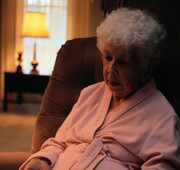
TUESDAY, Aug. 9 (HealthDay News) — Elderly women who experience sleep apnea have a higher risk of developing mild cognitive impairment or dementia, new research finds.
The study found that elderly women who began the study without dementia had 85 percent higher odds of developing mild cognitive impairment or dementia over the next five years if they had 15 or more sleep apnea events per hour of sleep.
“This was a prospective study of elderly women followed over time to understand the relationship of sleep apnea and cognitive impairment or dementia,” explained study co-author Dr. Susan Redline, a researcher in the division of sleep medicine at Brigham and Women’s Hospital in Boston.
“We found a very high prevalence of untreated sleep apnea — about one third of the women had sleep apnea, and those women had about an 80 percent increased risk of developing cognitive impairment or dementia during the study,” said Redline.
Although this study wasn’t designed to uncover the mechanism by which repeated oxygen deprivation might cause dementia, Redline noted that it may harm brain health by affecting the way the brain constantly replenishes its cells. More research needs to be done to find the exact mechanism, she added.
The findings are published in the Aug. 10 issue of the Journal of the American Medical Association.
The study included 298 women who did not have dementia at the start of the study. The average age of the women was approximately 82. All of the women underwent an overnight sleep study using sensors and computerized monitoring (polysomnography) between 2002 and 2004.
One hundred and five women were diagnosed with sleep-disordered breathing. That meant they had 15 or more sleep apnea episodes per hour of sleep. During those episodes, the brain was temporarily deprived of oxygen.
Five years after the sleep study, women were given cognitive function tests to assess their brain health. When the researchers compared the brain health of women who had sleep-disordered breathing and oxygen deprivation to women who did not, they found that sleep-disordered breathing significantly increased the risk of mild cognitive impairment and dementia.
The researchers also adjusted the data to account for other factors that could contribute to cognitive impairment or dementia, such as age, education, body-mass index, diabetes, smoking, medication use and baseline scores for brain health, according to the study.
They found that 31 percent of women with normal night-time breathing patterns developed cognitive impairment over the study period, compared to 45 percent of the women who had sleep-disordered breathing. That translates to 85 percent higher relative odds of cognitive impairment or dementia for the women with sleep-disordered breathing.
They also found that the cognitive impairment was associated with bouts of oxygen deprivation caused by sleep apnea, but not with fragmented sleep (such as arousal or waking after falling asleep) or sleep duration.
Since sleep-disordered breathing affects up to 60 percent of the elderly, any association between sleep apnea and cognitive impairment — even a modest one — could have a major public health impact, the researchers noted.
But whether or not treating sleep-disordered breathing could reduce the risk of dementia or cognitive impairment is the “million dollar question,” said Redline. She said other research suggests that several months of sleep apnea therapy may help improve brain function, but that much larger studies with longer treatment periods and a more diverse population need to be done.
“This could be a chicken-and-egg problem,” pointed out geriatric psychiatrist Dr. Gary Kennedy from Montefiore Medical Center in New York City. While it may be that sleep-disordered breathing contributes to cognitive impairment or dementia, the converse could be true; dementia might contribute to sleep-disordered breathing somehow, he said.
Still, said Kennedy, “this is one of those rare, positive and hopeful articles. If the abnormalities in getting oxygen are what’s causing the damage to the brain, it’s a potentially reversible or preventable problem.”
Redline said that anyone with symptoms of sleep apnea — loud snoring, long pauses in breathing, feeling unrefreshed in the morning despite a full night’s sleep — should bring these symptoms to his or her doctor’s attention and discuss treatment options.
More information
Learn more about sleep apnea from the National Heart, Lung, and Blood Institute.

